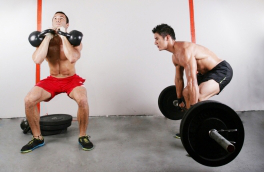Your squat is not my squat
Paul Kochoa, PT, DPT, OCS, CGFI
The squat is a basic, functional movement pattern that I teach to most of my patients. The other day in the fitness center, I saw a member squatting with some good range of motion. His hips were going well below his knee crease, all with about 225lbs of weight. But he was moving with the dreaded “butt wink“.
Most fit and healthy adults that exercise regularly are under the impression that squatting correctly means going “ass to grass”, getting as low as possible. But unfortunately, not everyone can do it. So… Your squat is not necessarily my squat.
Squat depth can vary from person to person depending on body type, anthropometric measures, joint size, and even past injuries. Correct assessment of these factors can really help determine your correct foot position, knee position, and squat depth.
The spine and trunk should be rigid and stable as you squat, trying to go lower than what your body can accommodate will produce a “butt wink” and will increase compressive shear forces on your lumbar spine.
What we could look at is your passive hip range of motion, how much flexion do you have at your hip? We would assess your joint mobility and determine what your hip position could be at the bottom of your squat. Then we could screen out your knee range of motion. Does your knee bend at least 130 degrees so your calf touches your hamstring? Then we could move onto your ankle. Does your ankle have at least 15 degrees of dorsiflexion to allow your heel to remain on the ground when you squat?
Then taking all that into account, we can move onto looking at passive range of motion compared to active weight bearing range of motion. Does your body move the same in both positions?
There are many factors that can affect how deep your squat could be, trying to go farther than what your body is physically capable of performing might cause pain or an injury. Don’t try and fit into a squatting technique that doesn’t work for you. Come in to Professional Physical Therapy and Training and have one of our physiotherapists check you out.
If you would like more information, please call Professional Physical Therapy and Training at 973-270-7417. Our offices are located within the YMCA locations in Madison and Summit, NJ. You do not need to be a member of the YMCA to visit with us.
